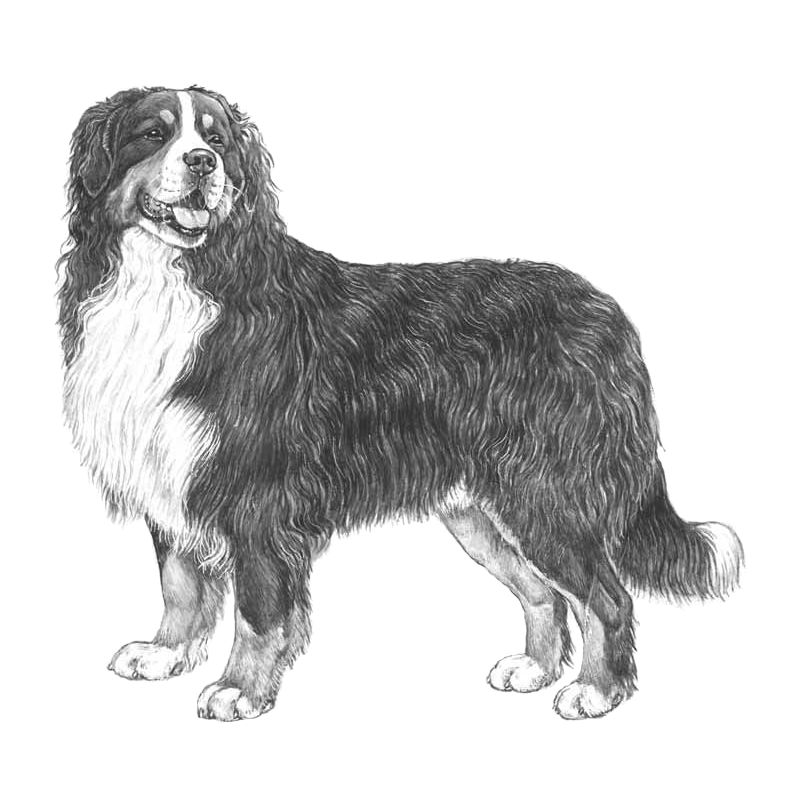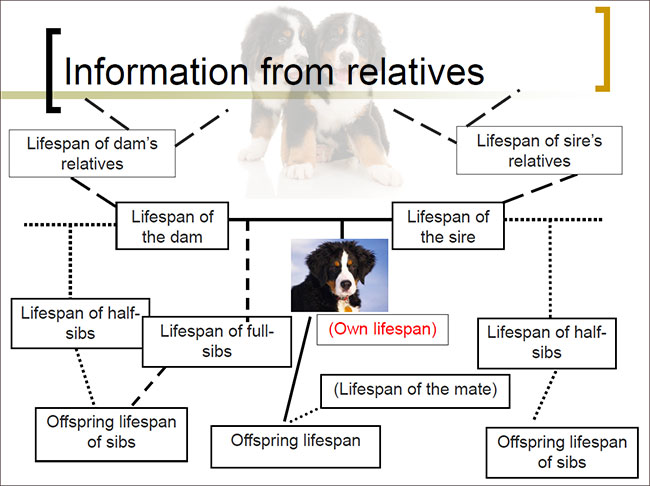Bernese Mountain Dogs were originally found in the valleys of the Bernese Oberland of Switzerland and were used as general multi purpose farm dogs. They were draught dogs pulling cart loaded with produce to market, items such as basket ware, cheese, or milk to the local dairy. The carts were also decorated for village festivals and celebrations which still puts the dogs as centre of attention today. They were also employed in helping to herd sheep and cattle to and from the mountain pastures. All Bernese carry the traditional Swiss colouring of black and tan with white markings.
Bernese Mountain Dog
- switzerland
- registration statistics
- swedish insurance data
- bernese mountain dog
- health surveys
- breed health database
- research

- Berner Sennenhund
- Bouvier bernois
- Perro boyero de montaña bernés
- National kennel clubs and breed clubs (see, e.g. Breeding/Health Strategy Documents, below)
- Population-level statistics (see, e.g., Swedish Insurance Data, below)
- Research articles
- Breed Club Surveys
-
Increasing Longevity with Estimated Breeding Values - 10th Bernese Mountain Dog International Health Symposium
Presenter: Katariina_Mäki_PhD
Contents include:
Introduction to EBVs
EBV for longevity: Bernese Mountain Dog data
Some conclusions
"Longevity as a trait in breeding is Complicated!
BUT...
With a large amount of data, hopefully some regularities can be found
If they are genetic, breeding for longer lifespan is possible." - Downloadable Information sheets include About Buying BMDs; Rescue, Bernergarde & Regional Clubs; BMD Health & Care; Activities with BMDs Numerical Index of BMDCA Info Sheets
- Also see the FKC's Database for registration, health, show, litters, breeding statistics and more.
- Health tests statistics
- Breeding strategies in the Swiss Sennenhund Association for Germany (SSV)Longevity, hip joint dysplasia, Elbow dysplasia
- Breed Health Conservation Plan (2018)
- Breed Population Analysis (2020) http://bernese.co.uk/health/wp-content/uploads/sites/3/Bernese-Mountain-Dog-population-update-2020-1.pdf - Internal-Bernese-Mountain-Dog-population-update-2020-1.pdf
- 2022 Presentations This page contains survey information from several countries.
- Berner-Garde Foundation - Open Bernese Mountain Dog Database (USA|English)
-
Also see
 Inbreeding Calculators - How They Work and What They Tell Us in DOWNLOADS.
Inbreeding Calculators - How They Work and What They Tell Us in DOWNLOADS.
-
SSV Dogbase, closed, member breeders only.
Used by the German, Swiss, and Austrian clubs. -
The Kennel Club – open
Look up BVA hip and elbow scores. - The Finnish Kennel Club - open (all breeds)
- Peri-articular Histiocytic Sarcoma and Previous Joint Disease in Bernese Mountain Dogs
- Risk Factors Associated with Development of Histiocytic Sarcoma in Bernese Mountain Dogs
They are one of 4 tri-coloured Swiss Mountain Breeds, (Appenzeller, Entlebucher and Great Swiss Mountain Dog being the other), but are the only one with longer coat. The Bernese is still popular in Switzerland generally but especially in the hills of the Bernese Oberland.
Links to Breed Descriptions
FCI:
The Bernese Mountain Dog is a farm dog of ancestral origin which was used as a guard and draught dog and for driving cattle in the prealpine regions and in the midland areas around Bern. Originally he was named “Dürrbächler” according to the name of the hamlet and of the inn of Dürrbach, near Riggisberg in the Canton Bern where these long-haired tricoloured farm dogs were especially numerous. In 1902, 1904 and 1907 specimen of this breed had already been exhibited at dog shows, and in 1907 some breeders of the region of Burgdorf decided to promote the pure breeding of these dogs by founding the “Schweizerischer Dürrbach-Klub”, and fixing the characteristic traits of the breed. In 1910, at a show in Burgdorf where many farmers of that region brought their Dürrbächler dogs to, already 107 specimen were shown.
From that day onward this dog, renamed “Bernese Mountain Dog” following the example of the other breeds of Swiss Mountain Dogs, became rapidly appreciated all over Switzerland and in the neighbouring parts of Germany. Today the Bernese Mountain Dog is well known and appreciated all over the world as a family dog thanks to its striking tricoloured coat and its great adaptability.
 Illustrated FCI – Standard No. 45
Illustrated FCI – Standard No. 45
Bernese Mountain Dog (“Dürrbächler”)
Approved by the Swiss Club of Bernese Mountain Dog © 2020
Swiss Club of Bernese Mountain Dog

View more videos on AKC's YouTube Channel
View more videos on SCC's YouTube Channel
See: The German Kennel Club (VDH) for information and video (if available).
(Hint: your browser should be able to Translate to English, at least for text (e.g., right click in Google Chrome or Internet Explorer).)
This and other breed videos are available in full length here
For Judges: An Illustrated Commentary on the BMD Breed Standard (FCI)
Dansk Berner Sennen Klub: Health Symposium BerneseMountainApollo Hotel, Kennemerboulvard 25, NL-1976 EG Umuiden
Regula Bürgi: International Judge Meeeting - presentation: http://berner-sennen.dk/wp-content/uploads/2018/10/Health-Symposium-2018-Regula-Burgi.pdf -- (Internal: Health-Symposium-2018-Regula-Burgi.pdf)
Other Names for Breed
Country of Origin and Parent Breed Club
Country of origin: Switzerland
Health and Well-Being
Some sources of health information include:
Breed-Specific Articles
 Get a GRIHP! on Bernese Mountain Dogs
Get a GRIHP! on Bernese Mountain Dogs
This article on Bernese Mountain Dogs is part of a series to highlight the Big Picture of health, welfare and breeding and to help develop Globally Relevant Integrated Health Profiles (GRIHPs) for many breeds. See IPFD's Get a GRIHP! on Breed Health Initiative
Inbreeding Calculators - How They Work and What They Tell Us
University of PIttsburgh Medical Center
Bernese Mountain Dog - Hip Rating Comparison Chart
BMD International Health Symposium 9-2011 Kenilworth England
IWG International Health Symposium 8-2015
Consider...

Kirsi Sainio 30.8.2015
Presentation from the 10th Bernese Mountain Dog International Health Symposium
Breed Standard Review - BMDINFO.ORG
Bernese Mountain Dog Club of America - Info Series: Bernese Mountain Dog Breed Information Sheets
Breed Standards
There are numerous breed standards.
The basis of breed/conformation shows is the judging of pedigree dogs against the 'Breed Standard', which is a picture in words that describes the range of features that are deemed appropriate for the breed.
Three of the major international standards are:
Breed-Specific Statistics
1. Swedish Insurance Data
Breed-specific information on rates of disease and death from Agria Pet Insurance (Agria Djurförsäkring) is available for many breeds.This breed has information on Veterinary Care and Life Insurance.
| Bernese Mountain Dog: | 2006-2011 | 2011-2016 |
2. Breed Club Health Surveys:
3. Health testing: Orthopedic Foundation for Animals (OFA): Bernese Mountain Dog - Report of OFA Evaluations
OFA statistics for BMDs and other breeds are available.
4. Norwegian Kennel Club Bernese Mountain Dog Breed Statistics
5. BMD Breed Statistics - AKC Registrations and OFA data on Hips and Elbows - multiple years
6. Finnish Kennel Club - Bernese Mountain Dog - Report 2010 - 2014: health information and data including HD | ED statistics. See downloads: Berninpaimenkoira - Bernese Mountain Dog (in Finnish)
7. SSV: see Schweizer Sennenhund-Verein für Deutschland e.V.'s Rassen & Zucht Allgemeine Infos
8. USA: Breed Statistics - Registrations and Health
This file, created for presentation at the 4th Dog Health Workshop Breed-Specific Health Strategies sessions, contains data on BMD testing for vWD, DM and HS Pre-test.
Breeding/Health Strategy Documents
Health/Breeding Strategy Documents and Links:
1. The Kennel Club, UK: Breed Watch
2. Sweden: Breed-specific Breeding Strategies: (in Swedish) and/ or English summary
3. Finland: Breed-specific Breeding Strategies: JTO: Berninpaimenkoirien jalostuksen tavoiteohjelma 2022-2026
JTO 2015-2019--Bernese Mountain Dog.pdf (in Finnish)
4. Germany: SCHWEIZER SENNENHUND-VEREIN FÜR DEUTSCHLAND e. V. - SSV
5. Degenerative Myelopathy in Bernese Mountain Dogs
From an explanation of what degenerative myelopathy is (symptoms, diagnosis), a clear overview of the genetics of the disease (what we know and do not yet know), through recommendations for how to use test results to make informed breeding decisions, in August of 2017 Pat Long put together this informative article on "Breeding Bernese Mountain Dogs to Avoid Degenerative Myelopathy without Negatively Impacting the Gene Pool".
6. Denmark: Breed-specific Breeding Strategies: RAS: http://berner-sennen.dk/wp-content/uploads/2021/06/Race-Avls-Strategi-2021.pdf
Breed-Specific DNA Tests:
Other Breed-Specific Webpages
INTERNATIONAL: B-IWG
Check under the "Events" tab for materials/presentations!
Databases:
NOTE: Databases listed are identified as "open" or "closed"; data availability may be for BMDs only or purebred dogs in general; language utilized may vary.
Breed-Specific Research
Letko A, Hédan B, Snell A, Harris AC, Jagannathan V, Andersson G, Holst BS, Ostrander EA, Quignon P, André C, Leeb T. Genomic Diversity and Runs of Homozygosity in Bernese Mountain Dogs. Genes. 2023; 14(3):650. https://doi.org/10.3390/genes14030650
Life expectancy and causes of death in Bernese mountain dogs in Switzerland
Michael Klopfenstein, Judith Howard, Menga Rossetti and Urs Geissbühler
Published: 25 July 2016
"New regulations by the Swiss Federal Food Safety and Veterinary Office provide for the monitoring of breed health by Swiss breeding clubs. In collaboration with the Swiss Bernese Mountain Dog Club, the purpose of this study was to investigate the causes of death in purebred dogs registered by the club and born in 2001 and 2002."
Conclusions
"This study confirms the high prevalence of neoplasia in BMDs. Although the prevalence may be overestimated due to the lacking histological or cytological confirmation, neoplasia is an important factor for the low life expectancy in BMDs.
The diagnostic accuracy leaves much to be desired and further research on malignant processes with a high diagnostic standard is necessary to improve breed health."
Open Access --- BMC Veterinary Research
DOI: 10.1186/s12917-016-0782-9
© The Author(s). 2016
---------------------------------------------
Risk Factors Associated with Development of Histiocytic Sarcoma in Bernese Mountain Dogs
Authors: A. Ruple, PS Morley
First published: 10 May 2016
excerpt...
"Methods
An internet-based cross-sectional survey was used to collect information from owners of BMD diagnosed with HS and owners of disease-free littermates of dogs with HS. Mixed-effects logistic regression (MELR) and conditional logistic regression (CLR) were used in parallel to examine associations between potential risk factors and the occurrence of HS.
Results
When controlling for litter as a marker of relatedness, dogs diagnosed with orthopedic conditions were found to be more likely to develop HS (MELR, OR: 2.5, 95% CI: 1.5, 5.2; CLR, OR: 2.81, 95% CI: 1.1, 7.3), whereas dogs receiving prescription anti-inflammatory medications were found to be at considerably lower risk of developing HS (MELR, OR: 0.42, 95% CI: 0.2, 0.8; CLR, OR: 0.32, 95% CI: 0.1, 0.8).
Conclusions and Clinical Importance
These results suggest inflammation may be a modifiable risk factor for the development of HS in BMD."
Epidemiology, Pathology, and Genetics of Histiocytic Sarcoma in the Bernese Mountain Dog Breed
Jérôme Abadie*,Benoit Hédan*,Edouard Cadieu,Clotilde De Brito,Patrick Devauchelle,Catherine Bourgain,Heidi G. Parker,Amaury Vaysse,
Patricia Margaritte-Jeannin,Francis Galibert,Elaine A. Ostrander andCatherine André
excerpt...
" HS is a highly breed-specific disorder that has become of significant concern to Bernese mountain dog (BMD) owners throughout the world in recent years. The number of cases has expanded greatly in the last 10 years."
Canine Histiocytic Malignancies—Challenges and Opportunities
Katherine Kennedy, Rachael Thomas and Matthew Breen
"While infrequent in the general dog population there is a particularly strong breed predisposition to HM in Bernese mountain dogs (BMD) and flat-coated retrievers (FCR), with odds ratios of 45.0 and 62.0 respectively [3]."
Authors: Benoit Hedan, Rachael Thomas, Alison Motsinger-Reif, Jerome Abadie, Catherine Andre, John Cullen and Matthew Breen
The Bernese Mountain Dog Club of America's website contains information on current research studies.
Research studies and projects covered are:
• Histiocytosis;
• Mast cell tumors / Mastocytoma;
• Lymphoma / Lymphosarcoma;
• Hemangiosarcoma;
• Osteosarcoma;
• Melanoma;
• Degenerative myelopathy;
• Renal Dysplasia;
• Portosystemic shunt [liver shunt];
• Epilepsy;
• Progressive retinal atrophy;
• BMD DNA Repository
GO TO BMDCA'S HEALTH RESEARCH STUDIES PAGE FOR PARTICIPATION DETAILS.
Health Symposia - Research information/presentations: • B-IWG: Researchers, testing and BMD health
Cancer Research
Also see the B-IWG resources page for more cancer research info: https://berner-iwg.org/index.php/resources/
Breed Clubs
We are listing sites for National Breed Clubs with health or other information that might be helpful. Follow links below.
INTERNATIONAL B-IWG Contacts (Club Websites & B-IWG member contact info)
Australia: Bernese Mountain Dog Club of Victoria Inc.
Australia: Bernese Mountain Dog Club of Western Australia (BMDCWA)
Austria: Verein für Schweizer Sennenhunde Österreich (VSSOE)
Belgium: Belgische Sennenhonden Club
CKC - Canada: Bernese Mountain Dog Club of Canada
Denmark: Dansk Berner Sennen Klub (DBSK)
England: Bernese Mountain Dog Club of Great Britain
Finland: Finlands Sennenhundar (FSH)
France: Association Française des Bouviers Suisses (AFBS)
Germany: Deutscher Klub für Berner Sennenhunde (DCBS)
Germany: Schweizer Sennenhund Verein für Deutschland (SSV)
Hungary: Berner Sennenhund Club Hungária
Italy: Club Italiano Amatori Bovari Svizzeri (CIABS)
KBS: Regionalgruppe Bern
KBS: Regionalgruppe Dürrbach
KBS: Regionalgruppe Ostschweiz
KBS: Regionalgruppe Romand
Netherlands: Vereniging de Berner Sennenhond (V.B.S.H.)
Norway: Norsk Berner Sennenhundklubb (NBSK)
Sweden: Svenska Sennenhundklubben (SShK)
US: Bernese Mountain Dog Club of America
Report Entry
 Donate
Donate Inbreeding Calculators - How They Work and What They Tell Us in
Inbreeding Calculators - How They Work and What They Tell Us in 
Recommended Comments
There are no comments to display.
Join the conversation
You can post now and register later. If you have an account, sign in now to post with your account.
Note: Your post will require moderator approval before it will be visible.